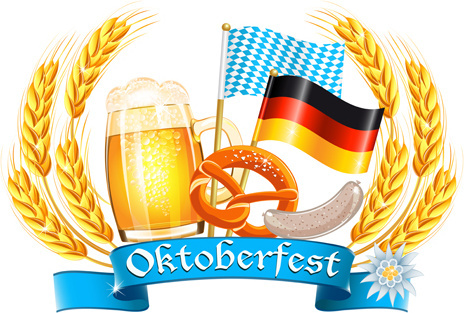
In October of 1810, Germany invented its own Dionysian festival. However, unlike the festivals of ancient Greece where the people had a strong appetite for wine, the Germans served beer as their major intoxicant. That year, Prince Ludwig of Bavaria married Princess Therese of Saxe-Hildburghausen, marking the beginning of the Oktoberfest.
As per royal orders, the festivities lasted for five days accompanied by parades, horse races, circuses, fireworks and of course beer feasts. During the 200 years of its history, the scale of Oktoberfest has grown in popularity and size. Nowadays it attracts millions of tourists and enthusiasts to Bavaria from different parts of the world.
Oktoberfest is held annually in Munich, the capital city of Bavaria. However, over the years the holiday has been interrupted multiple times due to unfortunate events. In 1854 and 1873 Oktoberfest was canceled because of cholera epidemics, then by the Austrian Wars in 1866, the Franco-Prussian Wars in 1870 and later by the World Wars. Celebrations in 2020 and 2021 were canceled due to the spread of COVID-19.
Fortunately, Oktoberfest managed to evolve and maintain its role in being part of the cultural life of Bavaria. In the late 1880s, Oktoberfest opened service areas for traditional hendl (Bavarian grilled chicken), wooden beer chugs were replaced by glass mugs and tents began to be built in modern, colorful decorations. Another interesting fact is that the first electricity-powered festival was powered by a company owned by the relatives of Albert Einstein.
The opening ceremony begins with the parade that starts from the Siegestor, Munich’s Victory Gates. The parade is led by a woman in monastic dressing with ringing bells, followed by decorated carts loaded with beers from different parts of Germany, then artists, musicians, dancers and other admirers. They walk to Theresa Meadow field, a large open space where the festival is held.
Oktoberfest is enormous. On average, over 6 million people visit the festival. Over 7 million liters of beer, 500,000 pounds of grilled chicken and 500,000 pounds of pork sausages are consumed over the five days of celebration. More than 10,000 people work as staff during Oktoberfest, enough to make up a small army.
One of the recent controversies surrounding Oktoberfest has been about the increasing prices for a mug of beer. In the early 2010s it would cost only about five euros; now a single mug can be over 10 euros. While the price spike can be explained with economic factors, it brings undesired consequences, such as smuggling. Some of the visitors bring their own alcohol — often cheaper and stronger — in order to mix with their beer.
Such practices often lead to alcohol poisoning. Around 500 so-called “beer corpses” can be observed lying around the tent on any given day of the festival. Thankfully, Red Cross workers carry out unconscious drunk participants to provide medical services.
For people who are interested in Oktoberfest but unable to travel to Bavaria, local groups organize similar events to honor the spirit of the festival. On Long Island, New York, Plattduetsche Volksfest Vereen (PVV) is among the societies that organize Oktoberfest festivals every year.
PVV is a society founded in Brooklyn by German immigrants in the late 19th century. In the 1930s they opened a beer garden and restaurant in Franklin Square called Plattduetsche Park, which is still open to this day. Here they provide authentic German cuisine and ambiance to Long Islanders, and during the first two weeks of every year, Plattduetsche Park invites guests to join the celebration of Oktoberfest.
Efforts made by hosts at the restaurant allow patrons to experience the essence of the festival with unforgettable impressions.
Needless to say, if you aren’t a regular drinker it is advised to train yourself in advance. Having a few beers daily for about a month in anticipation of the festival will warm you up. Don’t forget, you are being served beer by the liters in the tents.


















